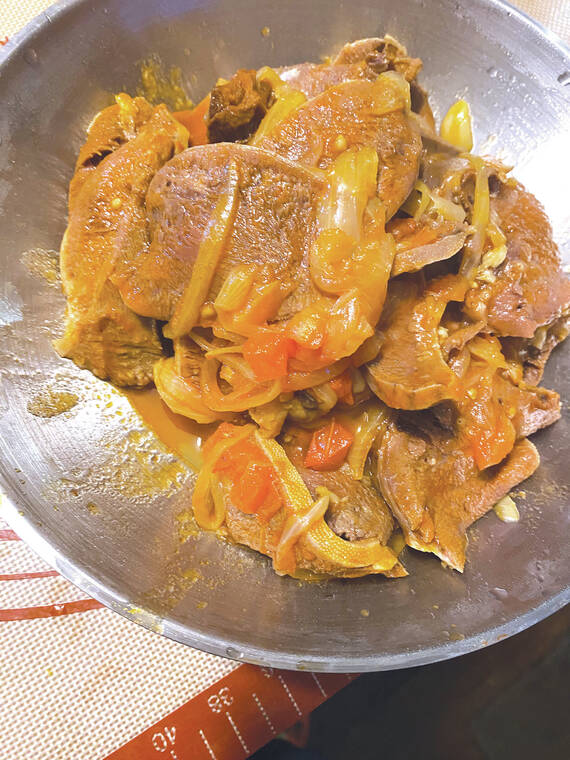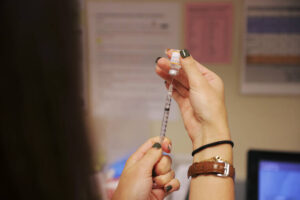Offal is also called variety meats or organ meats. The Germanic word “offall” means “garbage/rubbish or off fall,” literally meaning that these cuts have fallen off during butchering. This could mean blood, used to make blood sausage, brain, cheeks, chitterlings, ears, gizzard, gallbladder, gizzards, heart, head cheese, intestines, kidney, liver, omentum, pancreas, trotters, snout, spleen, sweet bread, swim bladder, tripe, oxtail and tongue.
In Scotland, haggis consists of sheep’s stomach stuffed with a boiled mix of liver, heart, lungs, rolled oats and other ingredients.
In English Midlands and South Wales, faggots are made from ground or minced pig offal (mainly liver and cheek), bread, herbs and onion wrapped in pig’s caul fat.
The British love kidney pie, made of veal or beef kidneys, liver of a lamb, calf, pig or cow, with onions and a rich sauce.
Brawn or head cheese is the meat and tissue on an animal’s skull, typically a pig, that is cooked in gelatin.
Black pudding is congealed pig’s blood with oatmeal made into sausage-like links with pig intestine as a casing, boiled, and then fried.
My father used to love tripe stew so my mother, to please him, made it although she did not care for it. The texture of the tripe is an acquired taste, but if you love it, there is nothing like a well made tripe stew.
Tripe is the lining of the stomach of a cow and honeycomb tripe is the cow’s second stomach. It is preferred because it is most tender and mildly flavored.
Tripe Stew
3 pounds honeycomb tripe
1 tablespoon baking soda
6-8 cups water
2 large onions, chopped
2 6-ounce cans tomato paste
4 large potatoes, peeled and cubed into 1-inch pieces
3 large carrots, peeled and cut into 1-inch pieces
3 stalks celery, cut into 1-inch pieces
Salt to taste
1 teaspoon black pepper
2-3 teaspoons cornstarch
1 cup water
1/2 teaspoon pepper
Wash the tripe thoroughly in cold water, removing excess fat.
Put the tripe into a large saucepan and cover with water.
Add baking soda and bring to a boil.
Parboil for 30 minutes, drain, wash, and cool the tripe. Cut into strips.
Place tripe, water and onions in a large pot and bring to a boil. Lower heat to medium, and add tomato paste.
Stir, cover the pot and let simmer and 1-1/2 hours or until the tripe is tender and slightly chewy. Add potatoes, carrots and celery. Cover and simmer for another 20 minutes, until the potatoes and carrots are soft. Make a slurry of cornstarch and add to the stew to thicken. Cook until cornstarch is cooked.
Add salt and black pepper to taste.
My friend Lorna Jeyte remembers eating a lot of offals during the war as the best cuts of beef went to the soldiers and what was available at home were the leftovers.
When I can get beef tongue, which is not very often, I like to prepare it with a tomato sauce and my grandson Quentin loves it!
Beef Tongue
1 medium (3-5 pound) beef tongue, rinsed
8-10 cups water, enough to cover the tongue
1 onion, divided
10 cloves garlic, peeled and chopped, divided
1 (15-ounce) can tomato sauce
1 large tomato, diced
1 tablespoon vegetable oil
Salt to taste
Fill a large pot with enough water to cover the tongue, 1/2 onion and 5 garlic cloves. Simmer for 5 hours or until the tongue is soft enough to peel. Remove from the water. Once cool enough to handle, carefully pierce and slice lengthwise through the top layers of the tongue. It should peel easily if it is cooked enough. Remove the top layer, gristle and fatty pieces.
Cut into 1-inch pieces
Heat a pan with oil on medium-high and saute the remaining 1/2 onion, sliced into rings, and 5 garlic cloves, sliced.
Once the onions are translucent, add the tongue pieces, tomato sauce and the diced tomato.
Mix well and saute for an additional 15 minutes or until the tomato becomes soft.
Add water, depending on how watery you want, and season with salt. Redtuce heat to low, cover and simmer for an additional 45 minutes.
With our busy lives, cooking offals often means cooking for a very long time and it may be why many people don’t like to prepare them. Pressure cooking can save up to one-third of the time needed to simmer. A slow cooker can be used on low while you are at work and your offal meal would be cooked to perfection.
HCC Culinary Program
Please check out menus online at http:/hawaii.hawaii.edu/cafeteria for the I Ola No Ke Kino (Cafeteria) or call (808) 934-2591 for menu specials for Da ‘Ohana Corner Cafe. There are designated 15-minute parking stalls for take-out orders.






